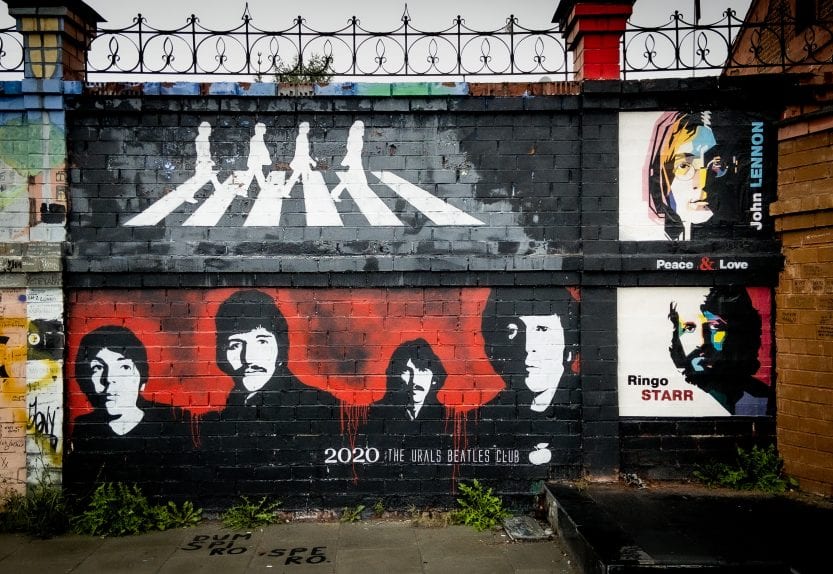Sam Cooke – “A Change is Gonna Come” (1964)
Sam Cooke was a black performer. When he heard the song “Blowin in the Wind”, by Bob Dylan, he wondered why it took a white man to talk about segregation when it was the black people who suffered.
In an incident where his wife, bandmates, and he were refused accommodation at a motel, Sam Cooke was compelled to write this song. This song was released only after his death and Sam Cooke only performed the song once in his life. Nonetheless, it has been listed as the most influential protest song for the Civil Rights Moment in America. The song contains the lyrics, “I go to the movie and I go downtown, somebody keeps telling me, don’t hang around”.
This song that talked about the segregation and racism that black people faced, now lives on in the memory of the people. The song was added to the National Recording Registry in 2007. It was contributed to an album called “The Stars Salute DR. Marin Luther King”, which collected funds for the civil rights organization SCLC.
2. The beetles – “I Wanna Hold Your Hand” (1964)
The song by the Beetles band supposedly helped begin the music revolution of the 1960s in America. The Beetles were the biggest rock’n’roll sensation that the world had ever seen. This song became the first song from the band to reach the shores of America. Until this point, they were purely British phenomena.
On February 4th, 1964, this song became number 1 on American music charts. It stayed on the top of the charts for seven more weeks. When the band arrived in America to perform the song, screaming fans greeted their arrival. Till today the song remains the best-selling single to have sold over 12 million copies. It was also the first song by a British band to reach number one in the U.S.A.
Before the Beetles invaded America with their music, British bands never caught on. This song paved the way for the fame of bands The Ruling Stones, The Kinks, and The Who.
3. Edwin Starr – “War” (1970)
The song that contained the lyrics “War. What is it good for? Absolutely nothing” openly protested the Vietnam War. It gave fuel to the anti-war protests that were raging in America at this time. Norman Whitfield and Barrett Strong wrote this song.
Edwin Starr criticized the foreign policy of America and the Vietnam War in particular. He said that war was the “enemy of mankind”, and a “friend only to the undertaker”. A politically-charged protest song that became one of the most influential songs of the 20th century. College students and protestors around the country exalted the song as the greatest anti-war protest song.
Edwin Starr later went on to win the Grammy Award for Best R&B Male Vocal for “War”. The song was later covered by Bruce Springsteen in 1986 and became a hit again.
4. Billie Holiday – “A Strange Fruit”
Billie Holiday wrote this song against the racist lynchings of Black American citizens that occurred mostly in the South. The lyrics make an allusion of the victims of lynchings to the fruits of trees.
The song has garnered the title “the song that began the civil rights movement” and “a declaration of war” against racism and segregation of Black Americans. Numerous prominent artists like Jeff Buckley, Nina Simone, UB40, and Dee Dee Bridgewater covered this song.. It went on to be introduced into the Grammy Hall of Fame in 1978. It was also present in the list “Songs of the Century” of the Recording Industry of America and the National Endowment for the Arts.
In 1999, Time magazine named the song as the “Best Song Of The Century” in its December issue. In 2002, The Library of Congress added the song to The National Recording Registry. New Statesman listed the song in the “Top 20 Political Songs” in 2010.
5. John Lennon – “Imagine” (1971)

“Imagine” John Lenon’s signature song. It is one of his best-known solo songs. The song is one of the most influential songs because the song is anti-capitalistic, anti-nationalistic, and anti-religious. The only reason the conservatives accepted the song was because it was sugar-coated. But the in-depth meaning of the song remains powerful.
The song has become known all over the world for its radical and ‘dangerous’ ideas. The song contains the lyrics “Imagine there’s no countries… Nothing to kill or die for”. The World Church even approached Lennon and asked him to change the lyric “no religion” to “one religion”, but he refused.
The song embraces radical ideas like communism and anarchy, sugar-coated with lyrics of love and positivity. It was an attack on the conventional understanding of the world. Nobody could imagine the political and cultural impact this song would have when it released.
6. Macklemore & Ryan Lewis feat. Mary Lambert – “Same Love” (2012)
Mary Lambert talks about how the church raised her while she knew she was gay. She frequently felt like she had to apologize to God for the way that she was. This led to sorrow and guilt about her identity. The song is an antidote to that shame and oppression go gay people.
Macklemore wrote the song to highlight homophobia within the hip-hop community. The song also talks about how the word “gay” is used as a derogatory term when it shouldn’t be.
“Same Love” is a very influential song of our time as it talks about how gay people feel like “I can’t change”, but they are forced to by the hetero normative society. It is a step towards marriage equality of all genders and peoples.
7. U2 – “Sunday Bloody Sunday” (1983)
This song is U2’s highly political song that describes and criticizes the action of the British paramilitary force. During a civil rights protest in Ireland, The British forces opened fire on 28 peacefully protesting people and killed 13 Irish citizens. The lyric of the song is a non-partisan critique of the bloody day that occurred in Ireland. Some citizens were shot at point-blank range and others were run down by army vehicles. The horrific incident is referred to as “Bloody Sunday”.
The song describes the events of the day from the eyes of an Irish observer. It is more about the struggles of the Irish people as they were oppressed by the British forces. Bono would raise a white flag while performing the song as a call for peace. The song has had a huge impact on the consciousness of the people, especially the Irish, because of the continued unrest in Northern Ireland during the 1990s.
8. Sex Pistols – “God Save The Queen” (1977)
A lot of British youth during this time felt alienated by the rule of the British monarchy. They wanted a change. The band released this song as a rebel song against British politics, especially the rule of the Queen. The manager of Sex Pistols decided to release this song on The Queens Silver Jubilee.
The band wanted to perform the song on the day of the Silver Jubilee outside Westminster Palace, but the authorities stopped them. The lyrics of the song did not fit well with the royal family. BBC’s Radio 1 excluded the song from their playlist by listing it as taboo, but this helped the song become even more remarkable. It sold 150,000 copies during the first week of its release.
The cover of the song shows the image of the Queen of England, with a safety pin pierced through her lip, which angered the establishment. The song was also re-released during the Golden Jubilee of the Queen in 2002. “God Save The Queen” became the great anthem of the punk movement in England and inspired a lot of young people to rise against the old-fashioned establishment.
9. Bob Dylan – “Blowin In The Wind” (1962)
The lyrics of the song suggest that it was a protest song, against war and racism generally. It greatly influenced the Black performer Sam Cooke to sing a song about racism.
This Bob Dylan song is like a fountain of poetry. It is the only Bob Dylan song that so many artists covered. Some artists who covered the song are Dolly Parton, Nickel Creek, and Neil Young. The Staple Singers became the first black group to do a Bob Dylan song.
“Blowin In The Wind”, was inducted into the Grammy Hall of Fame, in 1999. Bob Dylan claimed that he wrote the song in under 10 minutes. During his first performance, he couldn’t read some of his own handwriting and made up lyrics on the way. Magazines like Time, Playboy, and The New Yorker wrote stories about his first performance.
10. Public Enemy – Fight the Power(1984).
This song went on to become the band’s most famous song. Its lyrics sing about the glory of black pride. The band sang the song in a militaristic and confrontational way, and this method created controversy among people.
The song takes a dig at white icons like Elvis Presley and John Wayne. This is significant because most of the fans of the Public enemy were white boys. The song became a hit among the people who felt like they had to fight against the power. It talked about the experience of black people. On August 10, 1990, a memorable performance of the song took place in Memphis, Tennessee. It was a few days before the death anniversary of Elvis Presley, so the band reconsidered using the line against the icon.


